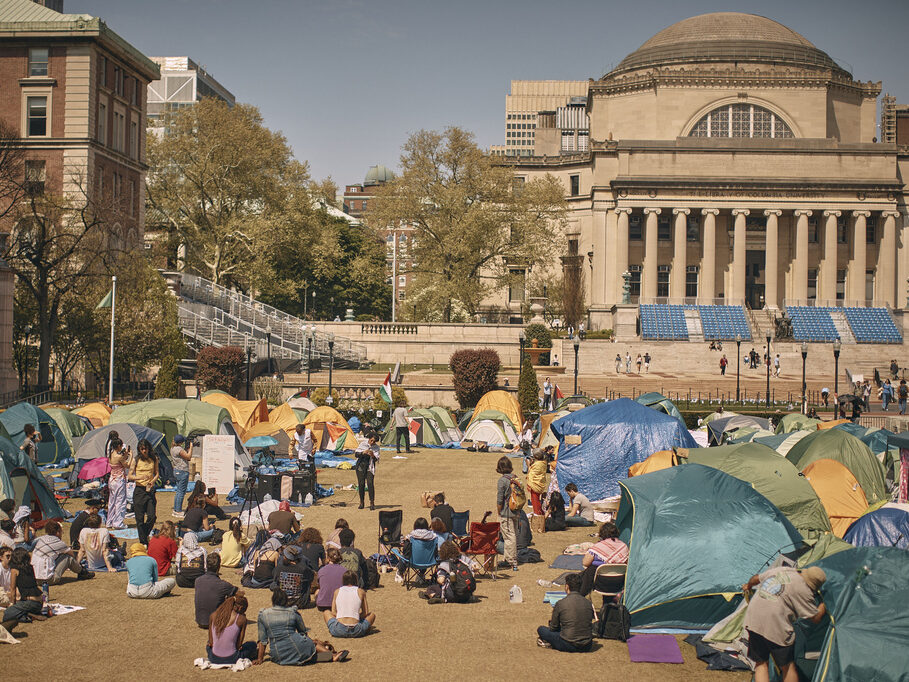NEW YORK (AP) — Colleges around the U.S. implored pro-Palestinian student protesters to clear out tent encampments with rising levels of urgency Monday, including an ultimatum from Columbia University for students to sign a form and leave the encampment by the afternoon or face suspension.
Columbia activists defied the 2 p.m. deadline with chants, clapping and drumming from the encampment of more than 300 people. No officials appeared to enter the encampment, with at least 120 tents staying up as the deadline passed.
The notice sent Monday by the Ivy League university in Manhattan to protesters in the encampment said that if they left by the deadline and signed a form committing to abide by university policies through June 2025 or an earlier graduation, they could finish the semester in good standing. If not, the letter said, they will be suspended, pending further investigation.
Early protests at Columbia, where demonstrators set up tents in the center of the campus, sparked pro-Palestinian demonstrations across the country.
Students and others have been sparring over the Israel-Hamas war and its mounting death toll. Many students are demanding their universities cut financial ties with Israel. The number of arrests at campuses nationwide is approaching 1,000.
College classes are wrapping up for the semester, and campuses are preparing for graduation ceremonies, giving schools an extra incentive to clear encampments. The University of Southern California canceled its main graduation ceremony this spring. Others are asking the protests to resolve peacefully so they can hold their ceremonies.
Fewer new tent encampments have sprouted around the country as the school year winds down. But students have dug in their heels at tent encampments at some high-profile universities, with standoffs continuing between protesters and administrators at Harvard, the University of Pennsylvania, Yale and others.
Protesters at Yale set up a new camp with dozens of tents Sunday afternoon, nearly a week after police arrested nearly 50 and cleared a similar one nearby.
Later Sunday, they were notified by a Yale official that they could face discipline, including suspension, and possible arrest if they continued the encampment on a grassy area known as Cross Campus, protesters and school officials said. No deadline to leave was set.
Yale said in a statement Monday that while it supports peaceful protests and freedom of speech, it does not tolerate policy violations such as the encampment. School officials said that the protest is near residential colleges where many students are studying for final exams, and that permission must be granted for groups to hold events and put up structures on campus.
Protests were also still active at a number of other campuses. Near George Washington University, protesters at an encampment breached and dismantled the barriers Monday morning used to secure University Yard, the university said in a statement. The yard had been closed since last week.
About 275 people were arrested Saturday at various campuses including Indiana University at Bloomington, Arizona State University and Washington University in St. Louis.
In its letter to student protesters, Columbia officials noted that exams are beginning and graduation is upcoming.
“We urge you to remove the encampment so that we do not deprive your fellow students, their families and friends of this momentous occasion,” the letter said.
Mahmoud Khalil, the lead negotiator on behalf of protesters, said university representatives began passing out the notices at the encampment shortly after 10 a.m. Monday. A spokesperson for Columbia confirmed the letter had gone out to students but declined to comment further.
Under the terms spelled out in the letter, students who leave the encampment would be put on disciplinary probation through June 2025. Students who are already receiving discipline, or who face harassment or discrimination charges for actions in the encampment, are not eligible for the offer.
Red and orange tents stayed up on the lawn as protesters considered the latest amnesty offer from the administration. A hundred feet away, a student cafe was open, and people enjoyed coffee in the warm spring sun.
On one side of the shuttered campus, students and staff lined up for security checks across the street from a cluster of TV trucks. At the other side, a police officer stood next to an unmarked black sedan with blue and red lights quietly flashing.
The demonstrations have led Columbia to hold remote classes and set a series of deadlines for protesters to leave the encampment, which they have missed. The school said in an email to students that bringing back police “at this time” would be counterproductive.
The students and administrators have negotiated to end the disruptions, but the sides have not come to an agreement, university President Minouche Shafik said in a statement Monday. The university said it will offer an alternative venue for the protests after exams and graduation.
Columbia’s handling of the protests has prompted federal complaints.
A class-action lawsuit on behalf of Jewish students alleges a breach of contract by Columbia, claiming the university failed to maintain a safe learning environment, despite policies and promises. It also challenges the move away from in-person classes and seeks quick court action requiring Columbia to provide security for the students.
Meanwhile, a legal group representing pro-Palestinian students is urging the U.S. Department of Education’s civil rights office to investigate Columbia’s compliance with the Civil Rights Act of 1964 for how they have been treated.
The plight of students who have been arrested has become a central part of protests, with the students and a growing number of faculty demanding amnesty for protesters. At issue is whether the suspensions and legal records will follow students through their adult lives.

